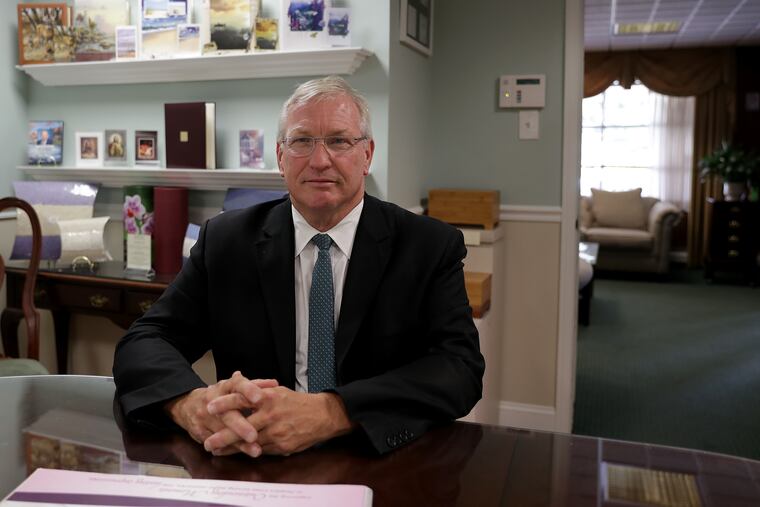In a first, New Jersey now allows funeral homes to serve refreshments to mourners
New Jersey has lifted a decades' old law that prohibited food inside funeral homes, leaving Pennsylvania as the only state that bars mourners from eating on the premises.

In New Jersey, mourners can now share memories and refreshments at the funeral parlor when they say farewell to loved ones, but there will be no champagne toasts at the casket.
A law signed by Gov. Phil Murphy lifts a decades-old ban that barred mourners from consuming food and beverages in funeral homes. Sponsors say the change provides a measure of comfort for mourners waiting to pay their respects and for grieving family members who may spend hours greeting guests.
“We were one of the few states that didn’t allow it,” said State Assemblywoman Nancy Pinkin (D., Middlesex), who sponsored the bill. “It just seemed like it was time for a change.”
Pennsylvania is now the only state that prohibits refreshments in funeral parlors. It took several years for passage of the New Jersey law; other states, most recently New York in 2016, gradually lifted similar bans over the years.
New Jersey’s ban was imposed in 1960 because of concerns about public health and keeping food away from embalmed bodies, said Althea Ford, executive director of the New Jersey Funeral Directors Association. Those concerns no longer exist with changing technology.
“It was just a very different time,” Ford said in an interview Thursday. “It’s now kind of an outdated law.”
Under the new law, mourners could get a cup of coffee or a beverage and possibly light refreshments, Pinkin said. Alcoholic beverages are not permitted. The law also prohibits the preparation of food on the premises, she said.
“Nobody is trying to have a party there,” she said. “It’s not the case that you’re going to be sitting there with the body eating.”
But Assemblyman Paul Moriarty (D., Gloucester), a cosponsor, said the law could give families more flexibility for levity to plan more upbeat life celebrations, which have become more popular. A repast could be held in a catering hall near the funeral home, he said.
“People are changing what they want in a funeral,” Moriarty said. “Some don’t want the somber, state viewing and funeral of the past. This is all about choices.”
Previously, funeral homes could provide only water and peppermints on the premises. Some funeral directors opposed lifting the ban and expressed concern about messy mourners dropping food or spilling beverages. Others believe having refreshments may be viewed as disrespecting the deceased.
In many cultures, food is a large part of the grieving process, whether at a repast after a funeral or during shivah in a home, and some funeral directors say it should be allowed at the funeral parlor. Years ago, wakes were held in homes, with bodies on display in the front parlor and food served nearby in the kitchen or dining room.
“I’m 100% for giving comfort for the family,” said LeRoy P. Wooster, owner of the Wooster Funeral Home in Atco. "I worry about how far will this go. I’m kind of leery of ‘Let’s go to the funeral home for lunch.’ ”
Wooster said he has started converting a room at his Camden County facility into a coffee lounge. Many larger funeral homes have separate rooms or sitting areas where light refreshments can be served, he said.
“It’s just one more part of the funeral service that’s a convenience to the family,” Wooster said. “I think it’s going to be a good thing.”
Ford said support was split among the 500 members of the association on repealing the food ban. Some smaller funeral homes may not have the space to provide special areas where food and beverages can be served, making those businesses less competitive, she said.
“It boils down to be able to provide a certain level of comfort and hospitality,” Ford said. “The least I can do is offer you a cup of coffee.”
Funeral homes have discretion to decide whether to serve food and refreshments on their premises, Pinkin said. The items must be distributed, stored, and consumed in an area separate from where a body is stored and prepared for disposition.
In Pennsylvania, state law bars food from being served in any part of a funeral establishment. In June, the state Board of Funeral Directors issued a statement to clarify the policy after receiving numerous inquiries about the prohibition. It said in part that “food or beverages, other than water, may not be served in any part of the funeral establishment where the professional practice of funeral directing is conducted.” The policy does not prohibit serving food or beverages in a separate hospitality room or lounge where the practice of funeral directing does not occur, the policy says.
In an email Friday, Wanda Murren, a spokesperson, said the board plans to create regulations to make the policy permanent.